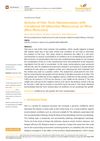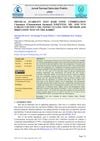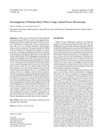 1 citations,
September 2022 in “KnE medicine”
1 citations,
September 2022 in “KnE medicine” Candlenut oil hair tonic helps mice grow hair, with higher oil concentration giving better results.
 March 2024 in “Journal of integral sciences”
March 2024 in “Journal of integral sciences” Rosemary oil may promote hair growth and is a natural alternative to minoxidil.
25 citations,
May 2008 in “Journal of cosmetic dermatology” Conditioning agents, especially jojoba oil and lauryl PEG/PPG-18/18 methicone, protect and strengthen chemically straightened Afro-ethnic hair.
 19 citations,
July 1993 in “Journal of Applied Toxicology”
19 citations,
July 1993 in “Journal of Applied Toxicology” Different oil products cause varying levels of skin irritation in mice, which could potentially lead to tumors.
 June 2022 in “Farmacevtičnij časopis”
June 2022 in “Farmacevtičnij časopis” The conclusion is that the technology for making "Biosedum plus" gel, which treats radiation skin damage, is validated.
 2 citations,
May 2020 in “Konuralp Tip Dergisi”
2 citations,
May 2020 in “Konuralp Tip Dergisi” Some dermatology patients use traditional and complementary medicine, often for acne, and many recommend it, but they need more information about its effects.
 July 2023 in “International Journal of Pharmaceutical Sciences and Drug Analysis”
July 2023 in “International Journal of Pharmaceutical Sciences and Drug Analysis” The study found different absorbance values for simplex and complex homoeopathic hair oils when analyzed with a UV-visible spectrophotometer.
 January 2024 in “Journal of cutaneous and aesthetic surgery”
January 2024 in “Journal of cutaneous and aesthetic surgery” Scalp injuries and harsh hair care can cause severe hair matting in children.
 May 2023 in “Jurnal farmasi sains dan praktis”
May 2023 in “Jurnal farmasi sains dan praktis” The hair tonic with cinnamon oil and coconut oil was stable and caused very mild irritation.
 43 citations,
September 2001 in “Scanning”
43 citations,
September 2001 in “Scanning” Hair treatments like bleaching increase friction by exposing tiny pores on the hair surface.
 222 citations,
January 2014 in “International journal of reproductive medicine”
222 citations,
January 2014 in “International journal of reproductive medicine” Insulin resistance and obesity are key factors in the development and worsening of polycystic ovary syndrome, and lifestyle changes are important for managing it.
 1 citations,
January 2015 in “Springer eBooks”
1 citations,
January 2015 in “Springer eBooks” The document says a skin condition called alopecia areata causes hair loss and stress, and is treated with strong skin creams, injections, or other therapies, but treatment success varies.
 38 citations,
May 2006 in “Archives of Gynecology and Obstetrics”
38 citations,
May 2006 in “Archives of Gynecology and Obstetrics” Women with only irregular periods or excess hair have a better hormone profile than those with full PCOS, but both groups are similar, indicating a need for better PCOS diagnosis methods.
 September 2019 in “Journal of Investigative Dermatology”
September 2019 in “Journal of Investigative Dermatology” Botanical extracts from peas and chia seeds improved scalp health and protected hair from pollution.

Some plant-based ingredients may help with hair growth and care, but more research is needed to confirm their effectiveness.
December 2024 in “Jurnal Ilmiah Farmasi (Scientific Journal of Pharmacy)” Nanotechnology could improve lavender oil's effectiveness, but more research is needed.
 December 2024 in “Majalah kedokteran Bandung/Majalah Kedokteran Bandung”
December 2024 in “Majalah kedokteran Bandung/Majalah Kedokteran Bandung” Carrot seed oil thickens hair roots and tips, with 75% concentration being most effective.
1 citations,
October 2022 in “Iet Nanobiotechnology” The dutasteride nanoemulsion could improve hair loss treatment by enhancing drug penetration and retention in hair follicles.
 20 citations,
March 2017 in “Journal of cutaneous pathology”
20 citations,
March 2017 in “Journal of cutaneous pathology” Shrinking of oil glands in the skin is a key sign of hair loss linked to TNF inhibitor drugs and may improve if the treatment is stopped.
 5 citations,
May 2022 in “Fashion and Textiles”
5 citations,
May 2022 in “Fashion and Textiles” Hair conditioners with argan oil or camellia oil improve the strength and color of bleached hair.
 August 2024 in “International Journal of Research in Dermatology”
August 2024 in “International Journal of Research in Dermatology” Indulekha Svetakutaja Hair Oil effectively reduces dandruff and improves scalp health.
3 citations,
January 2022 in “Journal of drugs in dermatology” Rice bran extract can help with hair growth, thickness, and color.
 65 citations,
September 2004 in “The American journal of pathology”
65 citations,
September 2004 in “The American journal of pathology” Blocking BMP signaling causes hair loss and disrupts hair growth cycles.
 4 citations,
May 2022 in “Future Journal of Pharmaceutical Sciences”
4 citations,
May 2022 in “Future Journal of Pharmaceutical Sciences” Melatonin-loaded microemulsion could be a promising treatment for hair loss.
35 citations,
January 2011 in “Journal of Biological Chemistry” sPLA2-X is crucial for normal hair growth and follicle health.
 February 2024 in “Journal of Cellular and Molecular Medicine”
February 2024 in “Journal of Cellular and Molecular Medicine” A hydrogel releasing pectolinarin speeds up wound healing and reduces scarring.
 43 citations,
January 2013 in “Indian Journal of Dermatology, Venereology and Leprology”
43 citations,
January 2013 in “Indian Journal of Dermatology, Venereology and Leprology” The article concludes that advancements in hair cosmetics require dermatologists to stay informed about products and their potential risks, including allergies and higher risks for hairdressers.
 November 2022 in “Piretc”
November 2022 in “Piretc” New ways to manage Azerbaijan's oil and gas industry using information technology are being developed.

Candlenut oil nanoemulsion increases hair growth in male rats and remains stable for 14 days at room temperature.
 June 2014 in “Basic & Clinical Pharmacology & Toxicology”
June 2014 in “Basic & Clinical Pharmacology & Toxicology” Some plant extracts may treat livestock diseases, certain animal treatments are safe and effective, but more research on drug safety and resistance is needed.

























